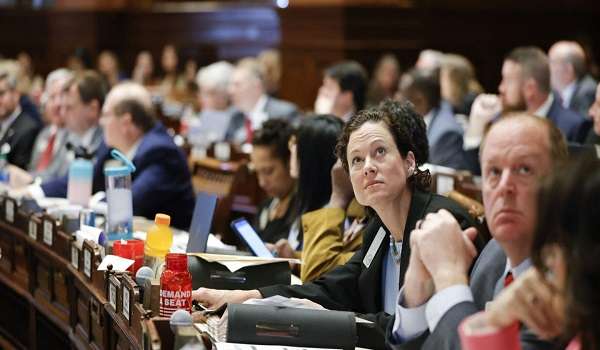Georgia Lawmakers “Play The Heavy,” Raising Weight Limits For Big-Rig Cargo
Georgia Lawmakers Saying Raising Weight Limits

In the state of Georgia, lawmakers recently passed a bill that increases the weight limits for big-rig cargo. This move has been met with both support and criticism, as it raises concerns about safety, road damage, and the impact on the trucking industry. In this essay, we will explore the various perspectives on this issue and discuss the potential implications of this decision.
Reducing costs and improving the economy
Firstly, let us examine the rationale behind this legislation. According to proponents of the bill, the higher weight limits will allow for more efficient transportation of goods, reducing costs and improving the economy. This argument is based on the premise that larger loads will reduce the number of trips required to transport the same amount of cargo, resulting in less fuel consumption and lower emissions. Furthermore, supporters argue that the new weight limits will put Georgia on par with other states, making it more competitive in the trucking industry.
About its potential impact.
However, opponents of the bill have raised several concerns about its potential impact. One of the most pressing issues is safety. Heavier trucks are more difficult to control and require longer stopping distances, increasing the risk of accidents. Furthermore, the added weight can put additional stress on roads and bridges, potentially leading to infrastructure damage and maintenance costs. This is particularly concerning in Georgia, where many bridges are already in poor condition.
Georgia Lawmakers say safety and infrastructure
In addition to safety and infrastructure concerns, opponents of the bill argue that it will have a negative impact on small businesses in the trucking industry. Larger companies with the resources to purchase heavier trucks will have a competitive advantage, potentially driving smaller companies out of business. This could lead to decreased competition and higher prices for consumers.
Another potential issue is the impact on the environment. While proponents of the bill argue that it will lead to lower emissions, opponents point out that this is only true if the trucks are fully loaded. If companies choose to transport smaller loads in larger trucks, the emissions savings may be negligible or even non-existent. Furthermore, the increased weight can lead to greater wear and tear on roads, which will require more frequent maintenance and repair, further increasing emissions.
Given these conflicting perspectives, it is clear that there is no easy answer to this issue. However, there are a few potential solutions that could mitigate some of the concerns raised by opponents of the bill. For example, the government could invest in infrastructure improvements to ensure that roads and bridges are able to withstand the added weight of heavier trucks. This would not only address safety concerns but also improve the overall quality of the state’s infrastructure.
Another possible solution is to provide incentives for companies to use more fuel-efficient trucks or to transport goods by rail or water. This would reduce emissions and relieve some of the stress on roads and bridges, while also providing an opportunity for smaller businesses to compete with larger companies.
Ultimately, the decision to raise weight limits for big-rig cargo is a complex one that requires careful consideration of all the potential implications. While the benefits of increased efficiency and competitiveness are undeniable, the safety, environmental, and economic concerns raised by opponents of the bill cannot be ignored. It will be up to lawmakers to find a solution that balances these competing interests and ensures the best possible outcome for all parties involved.
Conclusion
The recent decision by Georgia lawmakers to raise weight limits for big-rig cargo has sparked a heated debate about the potential impact on safety, infrastructure, and the trucking industry. While supporters of the bill argue that it will improve efficiency and competitiveness, opponents have raised concerns about the negative impact on small businesses, the environment, and road safety. As with any complex issue, there are no easy answers, but by considering all perspectives and exploring potential solutions, lawmakers can make an informed decision that benefits everyone involved.
